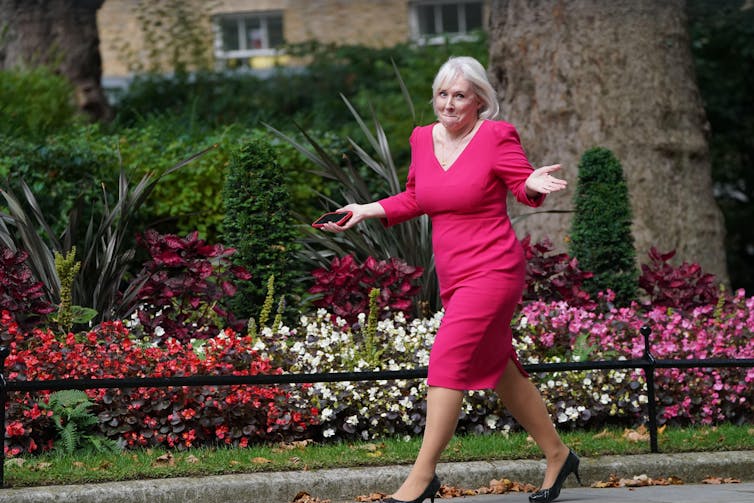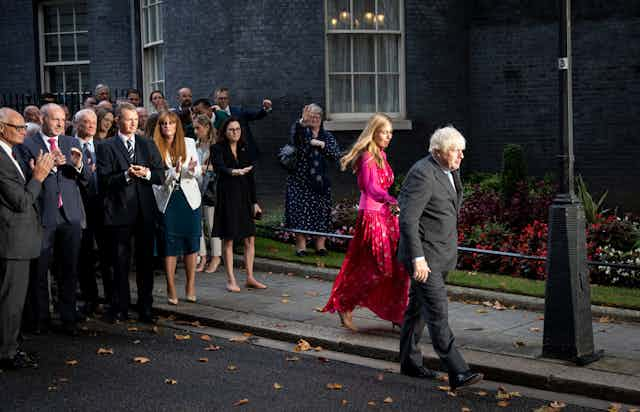Time for a quick quiz. What links Nadine Dorries, lockdown-rule-flouting London mayoral candidate Shaun Bailey and David Ross, a Tory donor embroiled in a scandal after funding a prime ministerial holiday to Mustique. If you answered, “They are all rumoured to appear on Boris Johnson’s resignation honours list,” give yourself ten points.
The UK’s resignation honours are one of many political peculiarities across the world, a bit like presidential pardons in the US, the logic of which falls apart under any serious scrutiny. They have been a sporadic feature of British political life since 1895.
These lists are a product of the UK having an appointed, as opposed to elected, second chamber. Someone has to choose who sits in the House of Lords and that someone is often the prime minister of the day. It has become convention that upon leaving office, the prime minister draws up a list of people to send to the Lords. And alongside this convention has emerged another: that they choose political allies, Downing Street staff and people to whom they owe favours, for one reason or another.
Lavendar lists and cash for honours
Not every prime minister has submitted a resignation honours list. Tony Blair, amid the “cash for honours” affair at the time of his departure, did not. Gordon Brown only sort of did. Probably the most controversial was Labour prime minister Harold Wilson’s resignation honours “lavender list” – largely seen as a vehicle to ennoble wealthy businessmen who were not altogether aligned with Wilson’s own party’s politics.
David Cameron’s resignation honours were, according to Liberal Democrat Tim Farron, “so full of cronies it would embarrass a medieval court”. And Theresa May’s were described by one journalist as “another sign of our rotting political system”.
The debate over resignation honours has been reignited most recently by two ongoing debacles. Boris Johnson’s efforts, which “confirm that he is a one-man walking argument for House of Lords reform”, and Liz Truss’s attempts to put forward a list despite the historical brevity of her tenure.
To appoint or elect?
A system of appointment is, by definition, not democratic. The House of Lords is unelected and for some – understandably – the argument stops and ends there. The Lords is also full to quite an absurd degree, currently seating 778 members. As Lewis Goodall of the NewsAgents podcast has said, “We’ve got more non-elected members of our legislature than elected.”
And since most political careers end in failure, an uncomfortable dissonance is triggered when watching an outgoing prime minister write up a list of people they think should be honoured. A resignation honours list is more often than not the last act of someone who has either resigned in varying levels of disgrace or lost an election.
However, an argument for the House of Lords as an appointed body (where one can sit for life) is that it provides some stability. It is a second chamber, with a clear oversight role as opposed to an active legislator. Sure, you get some complete chancers, but you get complete chancers everywhere.
More often than not, it does its role well, such as when it provided important checks through the Brexit process. Its select committees also often lead the way in thinking about complex questions with real rigour.
This speaks to the precise logic behind the Lords being appointed. The idea is to create an upper chamber largely conducting legislative oversight, led by experts in their respective fields – be it business, trade or academia (I await my letter in the post). And removing elections avoids many elements of the partisan nature of politics that can often get in the way of impartial analysis.

Of course, appointments run the precise risk of cronyism and favouritism. It is unavoidable. Though there is a system of vetting that attempts to mitigate any blatant attempts at such. The question is, is it really surprising that given the opportunity PMs offer seats in the Lords to friends, colleagues, allies and political donors? What else would you expect them to do?
Can we change the system?
The most obvious answer to the whole problem is to abolish the Lords and start again with an elected second chamber. But that is a big call. Doing so would rewrite the way politics functions in the UK. It would create an upper house which would be treated as on a similar (if not equal) footing as the House of Commons.
One only has to look to the US to see that having an elected upper and lower house doesn’t automatically lead to a more functional politics. Holding yet more elections would not necessarily be the best way to fill a chamber with a limited legislative function such as the House of Lords.
Another option might be to take the appointments role entirely out of the hands of politicians. That assumes, though, that politicians and only politicians are prone to acting according to (conscious or unconscious) biases.
A final suggestion is to replace the House of Lords with a citizens’ assembly – a body in which members of the public, chosen by lottery, deliberate over the legislation in a form of mass political jury service. It would be revolutionary, of course, but research has shown citizens’ assemblies can work very effectively in certain contexts.
There are no easy answers. This is why, time and again, politicians have simply put the notion of House of Lords reform in a box marked “much too difficult”. It’s a big job, with a raft of unknown unknowns and unintended consequences. The House of Lords is certainly in need of reform, but perhaps from a slightly more thoughtful starting point than as a knee-jerk response to recent political turmoil.

